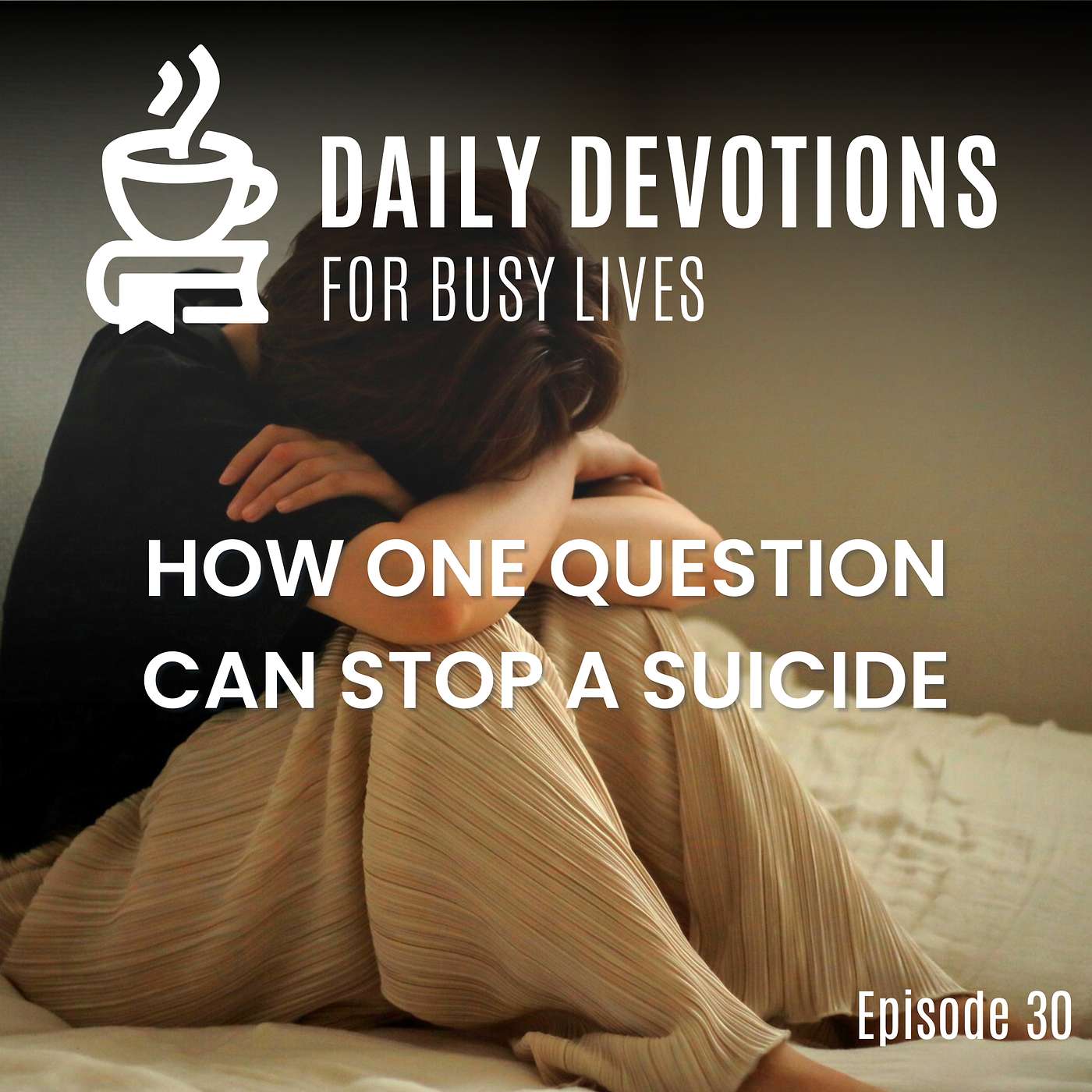How Could One Simple Question Stop a Suicide?

What if one question could stop a suicide?
It sounds too simple—too hopeful—to be true. But every day, people standing on the edge of despair are pulled back by something so basic, yet so powerful: a voice that sees them, asks them, and stays with them. The key to saving a life often begins with just a few words.
If you’ve ever wondered what you can do to make a difference—or if you’re the one who’s hurting right now—this blog post is for you. Behind every person who feels unseen or overwhelmed is a story that still matters. And sometimes, all it takes to stop a suicide is someone brave enough to ask.
Kevin Hines’ Story: A Jump and Immediate Regret
At 19 years old, Kevin Hines believed the world would be better without him. On the outside, it looked like he had it all. But inside, he was struggling. Mental illness clouded his mind, and depression distorted his reality.
He walked across the Golden Gate Bridge, climbed the railing, and jumped.
The moment his hands left the rail, he realized: he wanted to live.
“I thought it was too late,” Kevin later said. “But I didn’t want to die. I just wanted the pain to stop.”
Miraculously, he survived the 75-mph impact with shattered vertebrae but a beating heart. A U.S. Coast Guard boat pulled him from the water, and that rescue became a wake-up call that would change his life.
Now, Kevin travels the world telling his story. And he urges people everywhere to ask the question that could have changed his story before the jump: “Are you OK?” The fact is, he was not OK. And it's possible the simple question, "Are you OK? Or, "Are you thinking of suicide?" could have brought him the help he needed before he jumped.
The Heartbreaking Truth: Realization Mid-Air
Kevin isn’t alone in his regret. Studies of suicide survivors show that many people—if not most—experience immediate regret the moment they attempt to take their life.
That means the window to stop a suicide is real. It’s short. But it’s reachable.
Imagine the difference if just one person had stopped to ask Kevin how he was doing that day. He says he walked past dozens of people on the bridge—each a missed opportunity for connection.
He wasn’t looking for a sermon. He wasn’t expecting someone to solve all his problems.
He just needed to be seen.
And the truth is, someone near you right now may be walking through the same kind of darkness. They may not be shouting for help, but they’re hoping someone will notice.
Psalm 34:18: God’s Nearness to the Brokenhearted
That kind of pain can feel impossible to reach, but God sees it all. In Psalm 34:18, Scripture gives us this promise:
“The Lord is near to those who have a broken heart, and saves such as have a contrite spirit.” (NKJV)
God doesn’t pull away from the broken. He draws close.
He’s not waiting for us to fix ourselves first. He steps into our mess, our chaos, and our lowest places.
For anyone who has felt like their pain was too big or their life too broken, this verse is the answer: God is near. Not just aware. Not just concerned. Near.
And sometimes, the way God shows His nearness is through you and me.
The Power of “Are You OK?”: A Lifeline
As someone trained in suicide intervention, I’ve learned this: conversations save lives.
Not always. Not perfectly. But often enough to matter.
The phrase “Are you OK?” may sound small, but it can be a lifeline. And if the person hesitates or says “I’m fine” while clearly struggling, you can gently ask again:
“Are you really OK?”
Even more directly, if you’re concerned:
“Are you thinking of suicide?”
Asking this question doesn’t plant the idea—it opens the door for truth, for help, for healing. It breaks the silence.
And silence is where suicide thrives.
Practical Steps: How to Ask and Listen
If you’re not sure where to start, here are a few things to keep in mind.
-
Be Present, Not Perfect – You don’t need the perfect words. Just show up. Be there. Make eye contact. Speak gently.
-
Ask Directly – If you’re concerned someone may be thinking about suicide, ask them. You won’t make things worse. In fact, you’re offering a chance for connection.
-
Listen Without Judgment – Don’t try to fix everything right away. Just let them talk. Silence is OK. So are tears.
-
Don’t Promise to Keep It a Secret – If someone is at risk, it’s important to get them help. Involve professionals if needed.
-
Offer to Stay With Them – Even if it’s for a short time. A walk, a coffee, a phone call. Presence matters.
-
Connect Them to Help – Offer to call or text 988 with them. Or help them talk to a counselor, pastor, or doctor.
988 Suicide & Crisis Lifeline: Immediate Help
If you or someone you know is in crisis, don’t wait.
Dial 988.
This is the new, easy-to-remember Suicide & Crisis Lifeline number in the United States.
It’s free. It’s confidential. And it’s available 24 hours a day.
Please share it. Save it in your phone. And don’t hesitate to use it.
Because your life—or someone else 's-may depend on it.
Bringing Suicide Intervention Training to Your Community
This kind of care isn’t just for professionals. Each of us can learn to recognize the signs, have the difficult conversations, and become a safe place for someone in crisis.
That’s why I travel across the country offering suicide intervention training for churches, schools, and frontline organizations. It’s simple. It’s practical. And it’s lifesaving.
If you’re a pastor, ministry leader, school official, or simply someone who cares, I’d love to help you bring this training to your community. We could even provide it virtually over Zoom. And the great thing is, we can train your people in as little as three hours to learn the signs, ask the question, and get the person the help they need.
I don’t charge churches for this work. I just ask for a love offering to help cover expenses.
Together, we can raise up a generation of hope-givers.
Be the One to Ask
You don’t have to be a counselor to make a difference.
You don’t have to have all the answers.
You just need to care enough to ask—and stay close enough to listen.
Someone near you may be carrying more than you can see. Someone in your church, your workplace, or your home.
Don’t wait until the funeral to say what you wish you’d said.
Be the voice of hope today.
Prayer Request and Support
If you’re hurting—or walking with someone who is—I want to pray for you.
If you need support, please reach out. Let’s talk. You don’t have to carry this alone. You can text me by clicking here, or leave me a voicemail by going to dailydevotionsforbusylives.com/voicemail.
And if this blog post helped you, please share it. You never know who might need it next.
“The Lord is near to those who have a broken heart…”
He sees. He knows. And through you, He speaks.
Let’s be people who notice the pain, ask the hard questions, and stay to walk people home.
Because one question can stop a suicide.
And one person—you—can be the reason someone chooses to stay.
Listen to the companion episode, "How One Question Can Stop a Suicide."









